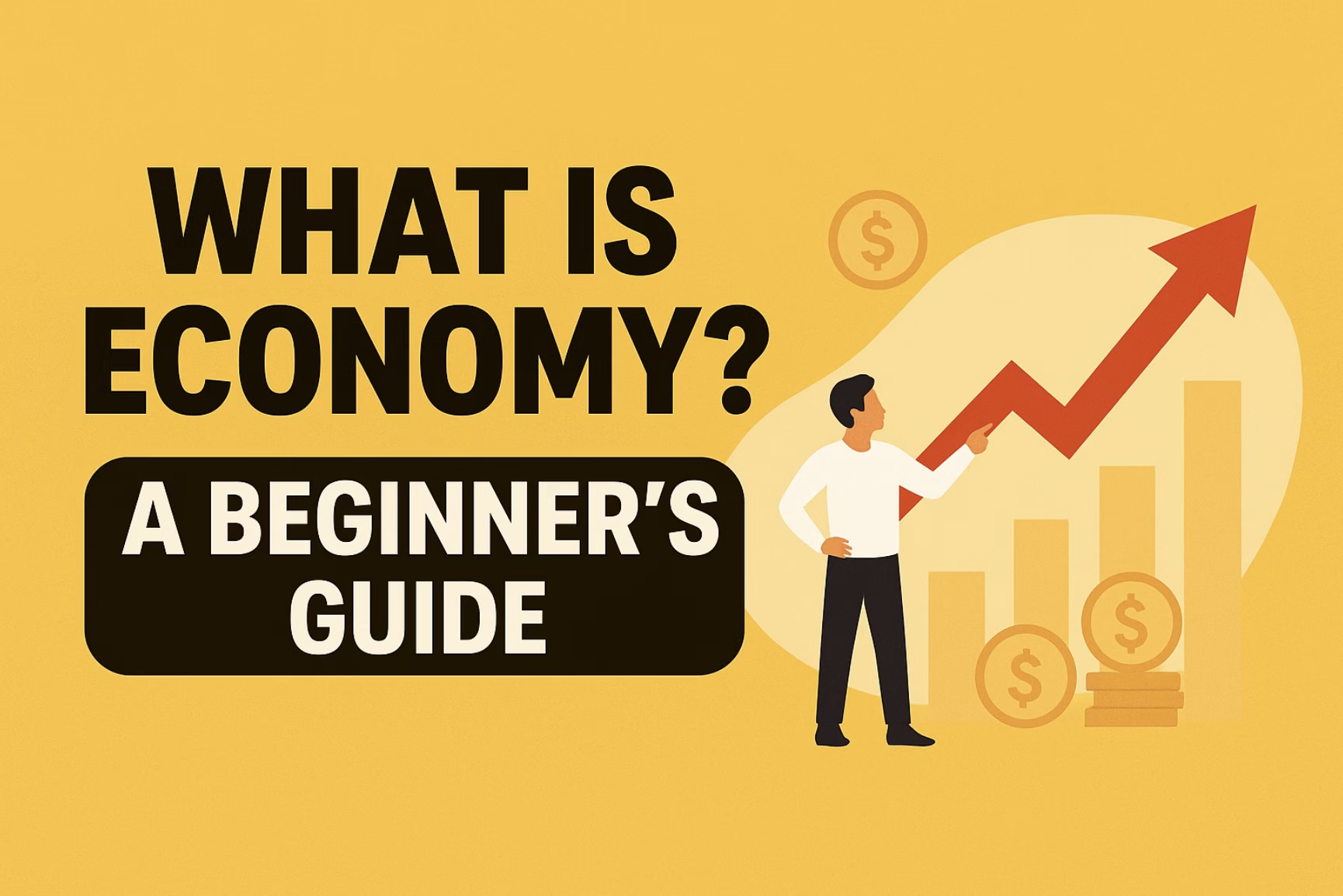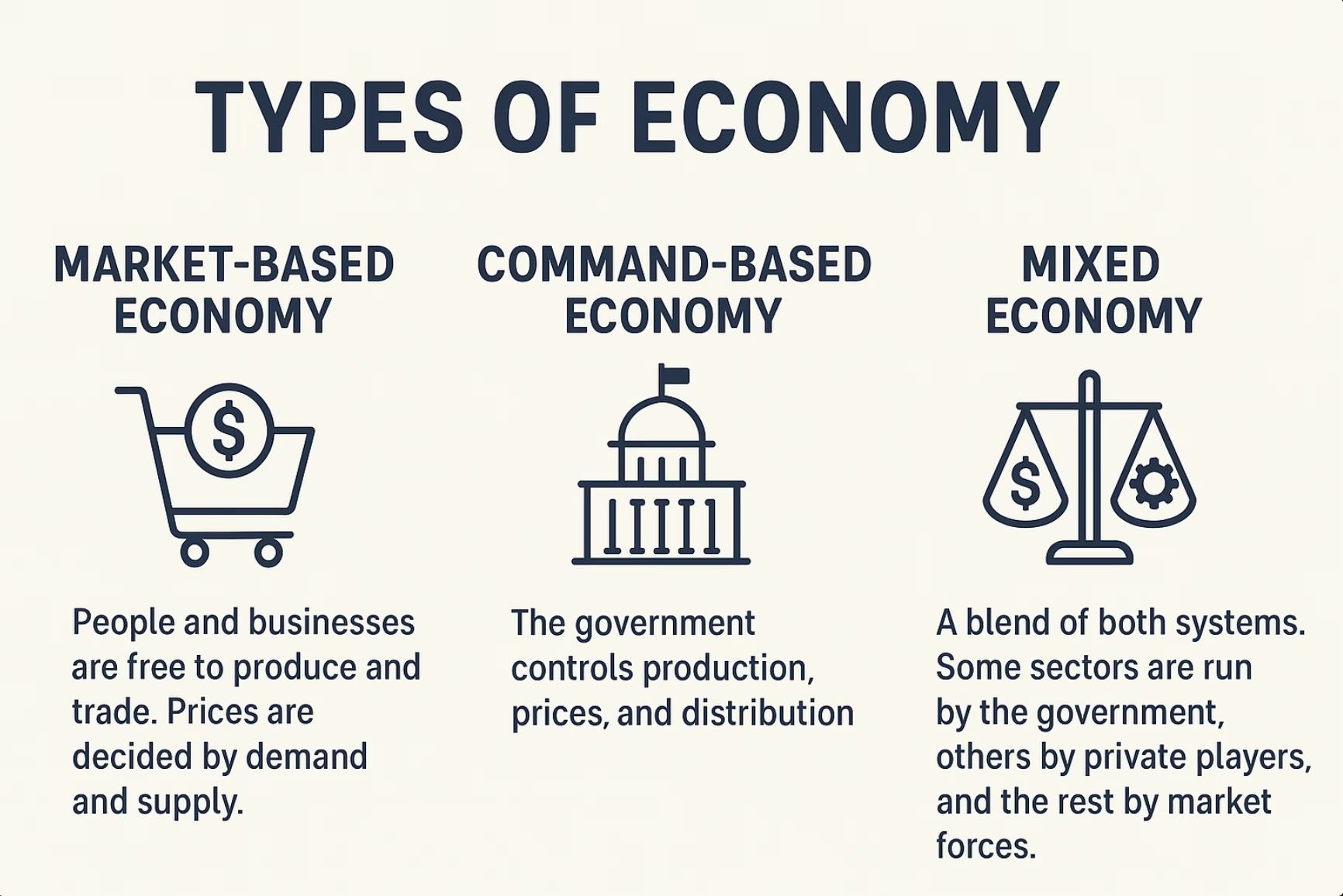When we hear the word economy in news, it often sounds complex. But these concepts affect our daily lifestyle, from the job we get or prices we pay. Let’s deep dive in economy what this really mean, how we measure them, and why they matter to us.

What is economy?
Economy is a system through which people in a country produce, consume goods and services, and trade. It includes everything from agriculture to manufacturing and banking, education, even online businesses. For example; when you buy shoes for $1,000 the owner of the shop’s income is increased by $1,000. Then he pays the wholesaler or distributors and he gives wages to people who work in his shop. And the remaining money he spends on food, rent and clothes. The same as employees, distributors and wholesalers also spend their income on basic necessities or some discretionary items. This money circulates from one person to another—this is called economy in simple words.
In short, the economy is the cycle of earning and spending that keeps money moving between people, businesses, and the government.

Types of economy
Economics is broadly divided into three parts:
Market based economies
Market based economies allow people and businesses to produce whatever they want and trade freely wherever they want to sell goods and services, with price decided by demand and supply. This means if the good is demanded very high then the price of good increases drastically and vice versa. US is mostly a market based economy. Producers decide what they want to sell and how much money they want to charge at base money, but their success depends on what consumers want and at what prices. If they are not creating such products and services, their chances of failure go up.
Command based economy
In a command based economy the government decides which product is produced, how much is produced, and at what price to sell. Instead of demand and supply working freely, the government takes full control of production and distribution. In such an economy most of the businesses are owned by the government on behalf of the people, and competition is also low and negligible, and prices are fixed by the government. For example, Cuba and North Korea run their economies in this way.
Mixed economy
A mixed economy is a combination of both the market based economy and the command based economy. In a mixed economy some sectors are controlled by the government, some sectors are controlled by the private players, and remaining are decided by the market forces. This balance allows both social welfare and economic growth. Example: India is one of the best examples of a mixed economy. The government ensures social justice and basic needs while private players drive the growth of the country.
Study of economies
The study of economies is known by the name economics. There are two ways to study economics: microeconomics and macroeconomics.
Microeconomics
Microeconomics is the study about how individuals, households and businesses take their decisions about using their limited resources (like money, materials and time). Microeconomics looks at small parts of the economy and does not focus on the whole economy. For example, why the prices of tomatoes increase and the demand goes down? These types of questions are asked in microeconomics.
In short, in microeconomics it studies about the small picture of the economy like how buyers and sellers interact in the market, and how the prices of goods are decided with the help of supply and demand.
Macroeconomics
Macroeconomics is the study of the large picture of the economy. Instead of looking at one shop, in macroeconomics we look at the entire country’s economy. It deals with topics like GDP, unemployment, inflation and imports and exports.
In short, macroeconomics is the big picture of the economy. It studies the whole country’s economy, not just one person or one shop.
Importance of economy
Economy is the backbone of the country. If the economy increases it will create jobs, people put their money in investment, spending is raised, the country funds infrastructure projects, and attracts investments. How does the economy increase? When people have money in their hands in whatever way—if any person is doing business or job—if their business and job do well, they earn more money and they spend more. It will raise the GDP, people are paying more taxes, and this will increase the economy. All things are interconnected in the economy. We can’t study only one thing, we have to study everything and connect it later. It will give you a better picture about the country.
Conclusion
Economy is not just numbers, it is more than that. Directly or indirectly we all are connected to the economy, whether you are a driver or you are a minister. A strong economy brings stability in the country and prosperity, but a weak economy creates chaos and brings uncertainty in the country. In the end economy is the invisible thread that connects people, business and nations into one large network of growth and survival.